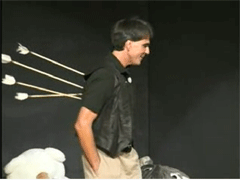
If you’re going to do anything that pioneering you will get those arrows in your back, and you just have to put up with it. I mean everything that could go wrong did go wrong.
—Dr. Randy Pausch
Life is not the way it’s supposed to be. It’s the way it is. The way you cope with it is what makes the difference.
—Virginia Satir, Founder of Family Therapy
Galba Bright over at Tune Up Your EQ has been writing about how to overcome your Emotional Intelligence hot spots. He wisely reminds us that it takes practice, and we can learn from each experience. In particular he would like us to share some of the methods/approaches we use to take care of ourselves and to respond effectively in the moment.
My approach used to be similar to his…have a list of questions to analyze the encounter and learn from it. His are
-
What did I do?
How did I do it?
How did I feel about what I did ?
What did I learn from what I did?
How can I apply what I learned to my career and my life in general.
Mine used to be
-
What was the situation?
What did I do?
What were my feelings?
What were my thoughts/assumptions?
What was the positive intention behind my reaction?
What needs/desires were left unsatisfied?
What might I have done instead?
What did I learn from the experience?
Using a list like that is a powerful way of getting out of the trap of obsessive thoughts and overwhelming feelings.
I’ve been doing this long enough now, though, that I don’t use the list consciously. My buttons still get pushed at times, but my automatic reaction now is to stop and breathe slowly to calm myself, and to gather information rather than react in the moment. If I’m upset I try, whenever feasible, to go off by myself and take care of my emotions first, usually by welcoming them and listening to what they’re trying to tell me. When buttons get pushed it’s usually because of past experiences that haven’t been fully processed. So I do look at my thoughts and assumptions about the situation and try to look at the present situation without associations from the past clouding my view. My main concern is to listen compassionately to myself, to figure out what I need, and to see the bigger picture. Are those needs are more appropriately met in the context of the present situation or somewhere else? Once I’ve taken care of myself, it’s usually clear if I need to address the present issue or let it go…it’s not hard to come up with a reasonable plan. As time goes on, of course, my buttons are less apt to get pushed and I can respond effectively in the moment.
And that’s one of the main points of the exercise…to process the present unpleasantness so that no matter what happens I can let it go and not create more buttons to be pushed in the future.
What about you? How do you handle your emotional buttons? This site is about sharing, so please tell us your thoughts in the comments section.
Photo from the Google video of Dr. Pausch.

I tend to dwell to long on any conflict that I experience in my life, so I should use this list to help me process and see if it’ll help me stop using up so much time just replaying the event in my mind and worrying about it.
Thanks!
Hello Jean:
Thanks so much for sharing how you “take care of yourself.” It’s very interesting that you progressed from a list to a new (automatic?) behaviour. Your insight triggers some more thoughts in me..so I’ll let them simmer for a while. ..I enjoy the dialogue with you and I hope our readers will find it useful.
Your list pretty well sums it up. Intention instead of result. ANd there is always a lesson to be learned, and then most importantly applied.
Pingback: Letting Go of the Monkey Trap — Transforming Stress Into Personal Power